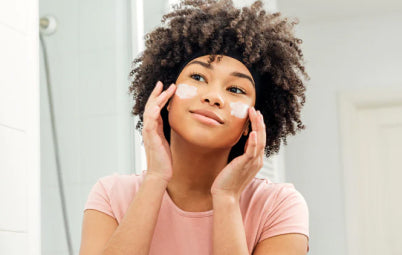We’ve probably all experienced hyperpigmentation at some point. This is the name for brown spots or patches of skin which appear darker than our usual skin tone. And, while it’s harmless and very common, many of us just don’t like the look of them, especially when new dark spots keep popping up.
Here at Face Dr, our skin experts have helped plenty of clients tackle their hyperpigmentation. From at-home skincare products to in-clinic procedures, there are plenty of ways you can lighten and brighten the look of these dark spots. So, if you’re noticing more discolouration or new dark patches—or you’re finally ready to do something about them—read on to find out how.
Want to get personalised advice? Book a free online skincare consultation with a member of our team.
What is hyperpigmentation?

Hyperpigmentation is a harmless and common skin condition where patches of skin become discoloured and darker than your usual skin tone. It can appear in a few different forms including small spots or large brown patches and this usually appears on the face and sometimes arms and hands or elsewhere on the body.
There are three main types of hyperpigmentation:
- Sunspots—also called age spots or liver spots
- Melasma
- Post-inflammatory hyperpigmentation
What causes hyperpigmentation?
All three types of hyperpigmentation are due to the skin making an excess of melanin, the natural pigment which gives your skin, hair and eyes their colour. But what exactly causes this excess melanin? There are three main causes:
- Sun exposure. Sunspots are caused by, not surprisingly, the sun. This is when our skin makes melanin to protect us against harmful UV rays.
- Hormones. Melasma is caused by hormonal changes, such as from pregnancy or the birth control pill.
- Inflammation. Post-inflammatory hyperpigmentation is caused by inflammation in the skin from injuries or conditions like eczema or acne.
Though these dark spots and discolouration aren't harmful, many of us don’t like their appearance and spend far too much time trying to cover them up. Luckily, there are some steps you can include in your skincare routine to reduce hyperpigmentation. So, if you’re looking to lighten unwanted dark spots, boost your confidence and even out your skin tone—not to mention, save time and money on make-up—read on for some simple steps you can take from home.
But first, prevention.
How to prevent hyperpigmentation
As with everything, the best treatment is prevention. If you know you’re prone to hyperpigmentation and want to prevent developing more in the future, there are a few simple things you can do to reduce your chances. These include:
- Wearing sunscreen daily
- Avoiding hormonal contraceptives, where possible
- Not touching or picking wounds, cuts or acne spots
Skincare routine to treat hyperpigmentation
Sunscreen

Who is it for?
Everyone!
How does it work?
We know you've heard this one before, but that’s because wearing sunscreen is one of the most important things you can do to take care of your skin. When it comes to skincare advice, wearing sunscreen is often the first piece of advice for everything from anti-aging to elasticity. And, it works for hyperpigmentation, too.
As hyperpigmentation is caused by an excess of melanin in the skin and sunlight causes our skin to make more melanin, avoiding excessive sunlight can help to decrease our chances of hyperpigmentation. Not only does sunscreen protect your skin from new hyperpigmentation from forming, but it keeps existing dark spots from getting even darker.
Look for a broad-spectrum sunscreen with an SPF of 30 to 50 and make sure to wear it daily, even when it’s overcast. Limit your sun exposure, especially during the middle of the day when UV rays are the strongest, and wear a hat and long sleeves, if possible. There are some studies which show that UV rays can penetrate windows, so take care when inside if you’re often seated by a sunny window, and that blue light from our computers could damage skin, too.
Lightening creams and serums

Who are they for?
Lightening creams have been proven to reduce the look of all kinds of hyperpigmentation including sunspots, melasma and post-inflammatory hyperpigmentation.
How do they work?
Lightening creams are usually the first thing people turn to when looking to lighten their dark spots. These are available over the counter, so you can easily buy them in a drug store or online. They can take the form of a face cream, cleanser, toner or serum and are usually applied twice a day, morning and night, as an additional step in your daily skincare routine.
Depending on which product you buy, some lightening creams are designed as spot treatments and are applied directly to the problem patch or spot, whereas others are an all-over treatment designed to brighten the entire face—or elsewhere on the body—and target overall discolouration.
Look out for ingredients like vitamin C extract, licorice root and hydroquinone. Ingredients like these work to combat hyperpigmentation by blocking the enzymes which make melanin in your skin and reducing the dark pigment which can be seen on the surface.
One benefit of lightening creams is that these products are more affordable than other types of treatment, like professional procedures. But they may take months to work or may not be effective at all as over-the-counter products contain a weaker concentration of ingredients.
Exfoliators

Who are they for?
As with lightening creams, there are many different exfoliators out there that have been proven to decrease dark spots from the sun, melasma and post-inflammatory hyperpigmentation.
How do they work?
Exfoliation works as a treatment for hyperpigmentation as it uses physical granules to remove the dead layer of skin cells on the surface of the skin. This allows new cells to be revealed underneath which are clearer and brighter.
Depending on their strength, you can find gentle exfoliators that can be incorporated into your daily skincare routine or stronger products which are usually used once or twice a week so as to not aggravate the skin.
Exfoliators can be effective at lightening dark spots but it does depend on how deep the discolouration goes. As they work by removing dead skin cells, they only work on the epidermis, the outermost layer of the skin, so deeper discolouration isn’t changed.
Chemical peels

Who are they for?
Chemical peels have been proven to lighten dark spots from sun exposure, melasma and post-inflammatory hyperpigmentation. They’re usually stronger than other options, so they’re great for those with deeper and darker hyperpigmentation but not for those who are in the sun often.
How do they work?
Similar to exfoliators, chemical peels lighten dark spots by removing dead skin cells. However, instead of using physical granules to remove these, they use chemicals and acids. These chemicals work by dissolving the molecules which hold dead skin cells together to loosen and lift them off your skin.
Chemical peels can come as pre-soaked pads which you can apply at home. This is usually a two-step process with two different pads. The first contains the acid and the second contains neutralising ingredients which stop the acid from overworking on your skin. Other types of chemical peels include serums with a lower percentage of acid which don’t need to be neutralised.
As scary as they sound, you can actually buy chemical peel products over the counter. These, however, have a weaker concentration of acids than the chemical peels which you can get through prescription or from in-office treatments. This means they’re not as effective but they are more affordable.
Due to the more aggressive ingredients, there is a risk of redness, irritation and blistering on the skin, especially with stronger products if your skin is sensitive or not used to this. Chemical peels also make your skin more sensitive to the sun and can end up increasing hyperpigmentation in the long run, so it’s especially important to wear sunscreen and avoid excessive sun exposure.
Which hyperpigmentation skincare products are best for my skin type?

If you have a specific concern in mind—like acne-prone skin or sensitive skin—be sure to either seek out products made with this skin type in mind or speak to a skincare expert to get the best recommendations.
When looking for skincare products for certain skin types, we usually look at dry, oily and combination skin. But, when it comes to hyperpigmentation, there’s a whole new skin type we need to take into account: Fitzpatrick skin type.
The Fitzpatrick skin types categorise skin by how much melanin you have and therefore how your skin reacts to sun exposure. There are six types ranging from fair skin to dark skin with fair skin burning more when exposed to sun and darker skin tanning more.
Fitzpatrick skin types 1 and 2
People with Fitzpatrick skin types 1 and 2 have fair skin, blond hair and blue or green eyes. If this is you, you probably burn and freckle easily and rarely tan, so you’re more likely to get sunspots. When it comes to hyperpigmentation treatments, these skin types respond well to most options although the skin may be sensitive, so always patch test to check for possible reactions.
Fitzpatrick skin types 3 and 4
If you have a medium skin tone, dark blond to brown hair, and brown eyes, you most likely have a Fitzpatrick skin type of 3 or 4. When in the sun, you tan more easily and are less likely to burn. As well as some lightening creams, these skin types respond well to stronger products like chemical peels.
Fitzpatrick skin types 5 and 6
Those with Fitzpatrick skin types 5 and 6 have darker skin tones and brown hair and eyes. You hardly—if ever—burn and tan very easily. This means you’re less likely to get sunspots but you’re more likely to get melasma and post-inflammatory hyperpigmentation. People with this skin tone should look for gentle lightening creams and mild exfoliators to lighten dark spots. Harsher products can cause reactions which lead to more discolouration. You can also look for products designed specifically with darker skin in mind.
Next steps

If you’re looking to treat hyperpigmentation but you’re worried about choosing the right product, we offer free online skincare consultations at Face Dr where you can speak with a skincare professional. Our skin experts will analyse your skin type and hyperpigmentation to find the best course of action for you and recommend some next steps to take to start tackling those dark spots.
We only ever recommend brands and products we know and trust, and those that use the latest science and skincare research. There’s never any obligation to buy, but if you do decide to make a purchase, we can ship your new skincare products directly to your door.








